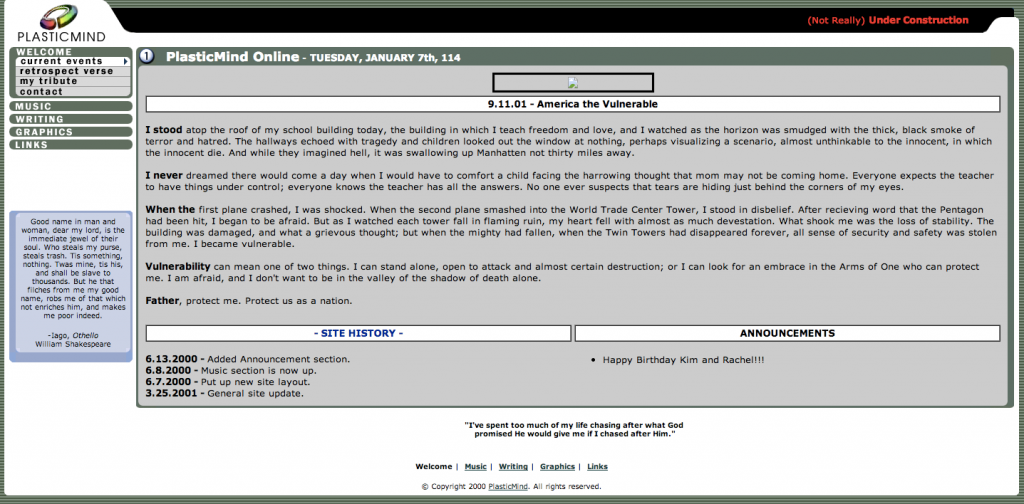I’ve been blogging on and off for almost fifteen years now, and one of the recurring problems I’ve struggled with is the stifling thought that what I’m writing had to be meaningful and cohesive.
Every time I sit down to write, I’ve got this nagging thought that everything I write has to be consumable by the masses. This hangs over my head like a cloud and creates a kind of “publish pressure” that often suffocates good ideas still in infancy.
I didn’t always feel this pressure.
In the early days, my blog (I just called it my website in those days) was more of a showcase of the stuff that worked. Throughout college and early in my teaching career, I filled dozens of notebooks with half-formed ideas: poems, songs, stories, sketches, doodles. Opening one of those notebooks is like peering into the seething cauldron that is my brain. Posting something to my site meant pulling something halfway decent from the bedlam and just tidying it up.

Things are different now. Now, I write specifically for my blog. I maintain a list of topics I’d like to write about, and when I have the time, I pick something off the list and… write.
But when you write for a blog, there are some built-in headaches.
First, there’s this hard-to-shake sense of how the finished article needs to look. The fact that I’m even using the word “article” gives some indication as to the pressure here. It can’t be too long because people are lazy rarely read long blog posts. It needs to have a clear beginning, middle, and end to effectively communicate the point in question. It needs some call to action at the end. It needs some witty hook at the beginning to sell it and some pithy title so people actually click through to read it. Oh, and I probably need some giant picture that conveys the emotion of the things I’m writing. sigh
There’s also this damnable pride that tends to stifle creativity and exploration. For someone just starting out writing publicly, this might not make much sense; but anyone with a few years of public exposure under their belt understands the pressure that comes from “having a following” or “cultivating a reputation”. How will this thing I’m writing be received by the people who typically read my blog and how will this further my reputation as a whatever-I-am. I try to forget about all of that and let the content speak for itself, but there’s always an angel and a devil on my shoulder arguing about this as I write.
Finally, when you share your thoughts publicly, they tend to take on a life of their own. People want to converse with you about what you’ve written. Some agree; others disagree. Some need clarity; others just want to give you a passing thumbs up. Then there are the self-proclaimed guardians of language who feel the need to correct your grammer and spelling.
These considerations (along with several others I didn’t mention) have the tendency to turn blogging into a chore and rob you of the joy of writing.
Two things have helped me deal with some of these obstacles, and I’ve put them into any easy-to-digest list to get you to read this article and possibly even share it on your social network of choice.
Keep a journal.
For a month now, I’ve been writing almost every day without publishing anything to my site (using Day One). I’ve been writing about funny things my children do, Christmas traditions, memories from childhood, situations I’m dealing with at work and at church. Just… the stuff of life. I wanted to get back into the habit of writing for the sake of writing and writing without an audience.
In college, I had to do daily free-writes for a creative writing class I took. The assignment was simply to write non-stop for ten minutes. The topic didn’t matter and the finished free-write wasn’t graded, we just had to complete three pages. Doing this every day got me into the habit of writing, and occasionally one of them turned into a idea for a short story or something more substantial.
Not all ideas are worth sharing, and getting into the habit of journaling helps alleviate the “publish pressure” that comes with a blog. You can write and it can be terrible and no one will see the mess you made of that thing you wrote. The freedom to fail helps relax you which is typically when you do your best writing.
Don’t wait until your ideas are perfect.
While not all ideas are worth sharing, don’t just wait until your ideas are “perfect” before sharing them.
We hate being wrong or incomplete. It’s in our nature to want to solve things and answer questions and be right in our answers, but human beings are about change. A good portion of what I wrote when I was young is cringe-worthy, even the things I picked out as being worth sharing with the world. I’m sure I’ll think the same thing in twenty years about much of what I’m writing now.
But there’s tremendous value in explaining your thinking at the moment, though it obviously might change. I mentioned earlier the conversational aspect of blogging. Imagine a conversation with someone who never spoke if he thought he might be wrong. You might as well be chatting with a robot. We’re humans, we make mistakes. Do your best to be as accurate and worthwhile and meaningful as you can when you write, then…
Just write.

